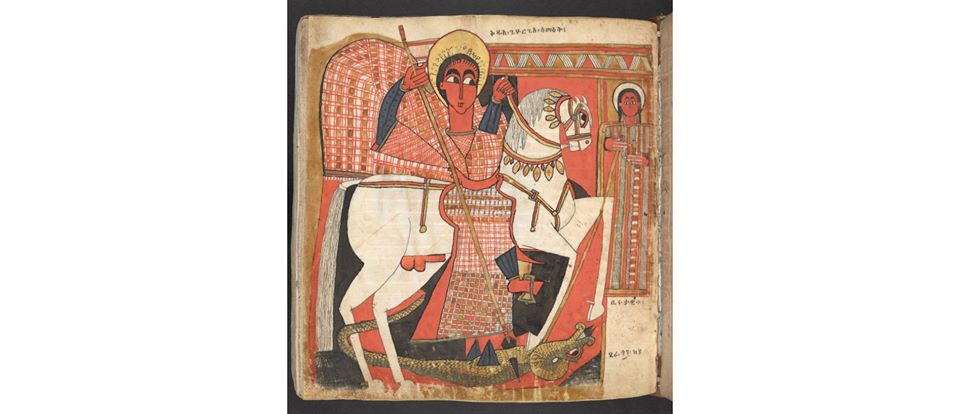EXTRAS
CALENDAR CUSTOMS
CALENDAR CUSTOMS
ST. GEORGE'S DAY
April 23rd
by Gail Hussey-Weir
Created April 2020
April 23rd
by Gail Hussey-Weir
Created April 2020
St. George's Day, April 23rd (believed to be the Saint's death date): Commemorates the Patron Saint of England. St. George's Day is a provincial holiday in Newfoundland & Labrador on the Monday closest to April 23rd.
St. George is the patron saint of England, Russia, Portugal, Greece, several other European countries and many European cities. He was a cavalryman in the Roman Army in what is now Israel, and was a Christian when Rome was ruled by an anti-Christian. He was said to have "slain a dragon" that had to be given a human sacrifice daily before access could be gained to the town's water supply. In gratitude, the townspeople converted to Christianity. George was tortured and eventually suffered a martyr's death when he was beheaded for refusing to make sacrifices to the Roman gods.
In the 1950s-60s when I attended the Anglican school on Bell Island, we had a holiday from school, but I do not recall ever being told the story of St. George, only that he was the Patron Saint of England and that he had slain a dragon. I also do not recall any activities celebrating St. George's Day, however, there was a report in the Daily News of 1931 that:
The S.U.F. observed St. George's Day by holding their first parade since they were reorganized in 1930. 13 bandsmen from Foxtrap headed the parade. Divine Services were held at St. Cyprian's Church with Rev. I. Parsons as the special preacher.
and in 1933:
"The S.U.F., L.O.A. and O.Y.B.A. societies celebrated St. George's Day with a parade to the United Church where Rev. S. I. Murley, B.A., was the preacher. The parade, numbering more than 200, was the largest St. George's Day turnout seen locally."
S.U.F. = Society of United Fishermen
L.O.A. = Loyal Orange Association
O.Y.B.A. = Orange Young Britons Association
St. George is the patron saint of England, Russia, Portugal, Greece, several other European countries and many European cities. He was a cavalryman in the Roman Army in what is now Israel, and was a Christian when Rome was ruled by an anti-Christian. He was said to have "slain a dragon" that had to be given a human sacrifice daily before access could be gained to the town's water supply. In gratitude, the townspeople converted to Christianity. George was tortured and eventually suffered a martyr's death when he was beheaded for refusing to make sacrifices to the Roman gods.
In the 1950s-60s when I attended the Anglican school on Bell Island, we had a holiday from school, but I do not recall ever being told the story of St. George, only that he was the Patron Saint of England and that he had slain a dragon. I also do not recall any activities celebrating St. George's Day, however, there was a report in the Daily News of 1931 that:
The S.U.F. observed St. George's Day by holding their first parade since they were reorganized in 1930. 13 bandsmen from Foxtrap headed the parade. Divine Services were held at St. Cyprian's Church with Rev. I. Parsons as the special preacher.
and in 1933:
"The S.U.F., L.O.A. and O.Y.B.A. societies celebrated St. George's Day with a parade to the United Church where Rev. S. I. Murley, B.A., was the preacher. The parade, numbering more than 200, was the largest St. George's Day turnout seen locally."
S.U.F. = Society of United Fishermen
L.O.A. = Loyal Orange Association
O.Y.B.A. = Orange Young Britons Association
